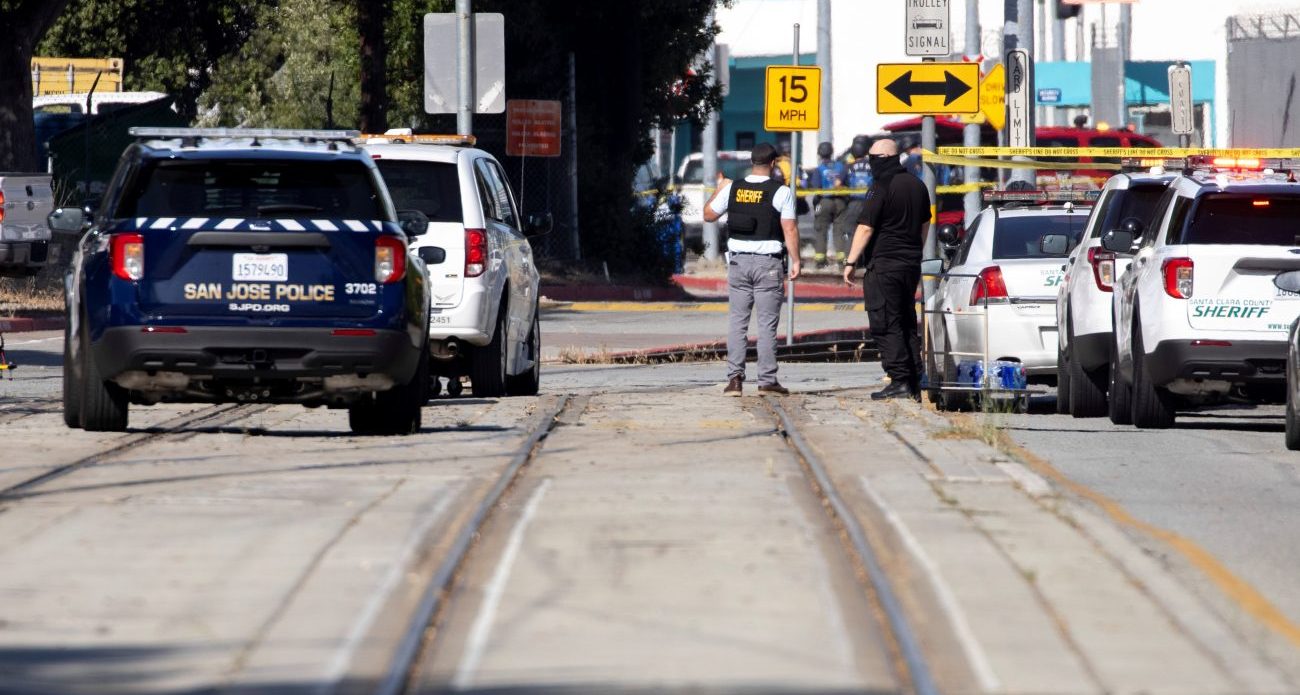SAN JOSE, Calif. (CNS) — San Jose Bishop Oscar Cantú urged prayers for the victims and their families after a gunman opened fire the morning of May 26 at a rail yard operated by the Santa Clara Valley Transportation Authority, or VTA, north of downtown San Jose.
Eight people were shot dead at the scene by the gunman, later identified by law enforcement as VTA employee Samuel Cassidy, 57. A ninth person was critically injured and taken to a local hospital, where he died that evening.
“May God comfort their families and loved ones and bring healing,” the bishop tweeted. “Pray also for all the first responders and law enforcement officers. May shock & grief give way to healing and grace, as we work together to protect the innocent and prevent such senseless acts in the future, so that peace may prevail in our hearts and communities.”
[hotblock]
The gunman also died at the scene from a self-inflicted gunshot wound, sheriff’s officials confirmed later.
“This is a horrific day for our city, and it’s a tragic day for the VTA family,” San Jose Mayor Sam Liccardo said. “Our heart pains for the families and the co-workers because we know that so many are feeling deeply this loss of their loved ones and their friends.”
NBC-TV Bay Area reported that at about 6:35 a.m., San Jose police received multiple 911 calls about gunfire at the VTA yard, and dozens of San Jose police and Santa Clara County sheriff’s vehicles responded to the scene.
Several law enforcement agencies also went to Cassidy’s home in San Jose to conduct a search. A fire had been set at the home early in the morning, but whether it was set before the shooting was being investigated, according to NBC-TV said. Technicians with the San Jose Police Department’s bomb squad were searching the suspect’s home as well as the VTA building at the rail yard.
The chairman of the U.S. bishops’ domestic policy committee said the shooting “reminds us once again that something fundamentally broken in our society and culture must be courageously examined and addressed, so that ordinary places no longer become scenes of violence and contempt for human life.”
“It is particularly tragic that in a city named in honor of St. Joseph, who was such a loving guardian of the Holy Family, we are unable to protect our own fellow citizens from the ravages of gun violence,” he added.
[hotblock2]
In a statement released late May 26, Archbishop Paul S. Coakley of Oklahoma City, chairman of the U.S. Conference of Catholic Bishops’ Committee on Domestic Justice and Human Development also said: “As Americans, we must understand why these horrific occurrences of violence continue to take place in our communities, and then unhesitatingly act to root out the causes of such crimes.”
The USCCB, he said, “has called for many years for rational yet effective forms of regulation of these dangerous weapons” and also has “urged increased mental health outreach and services to identify and treat potential areas of conflict before they become tragic occurrences.”
“Action is needed to attempt to reduce the frequency of these abhorrent acts through legislation and training,” he added.
Archbishop Coakley called on Catholics “to pray for the dead and injured, as well as for healing in the community. May the Holy Spirit, whose wisdom and guidance we celebrated this past Sunday on Pentecost, bring consolation and strength at this time of great loss.”
At a news conference at the VTA rail yard some hours after the shooting, California Gov. Gavin Newsom delivered emotional remarks, saying there is “a sameness to this” gun violence and called for additional gun control measures.
California already has comprehensive background checks, waiting periods and ammunition restrictions.
“It feels like this happens over, and over, and over again. Rinse and repeat, rinse and repeat,” he said. “It begs the damn question: What the hell’s going on in the United States of America? What the hell’s wrong with us? And when are we going to come to grips with this? When are we going to put down our arms, literally and figuratively?”
A day later, law enforcement officials said they still had no insight into Cassidy’s motive. His ex-wife, Cecilia Nelms, and a former girlfriend told reporters he had serious anger issues.
Nelms, who divorced him in 2004 after 10 years of marriage, said he often wanted to kill his co-workers, but she never thought he was serious. The ex-girlfriend alleged he raped her and suffered mood swings caused by alcohol.
PREVIOUS: USCCB president explains how planned discussion on Eucharist was set
NEXT: Bishops decry rise in anti-Semitic attacks in U.S.



Share this story